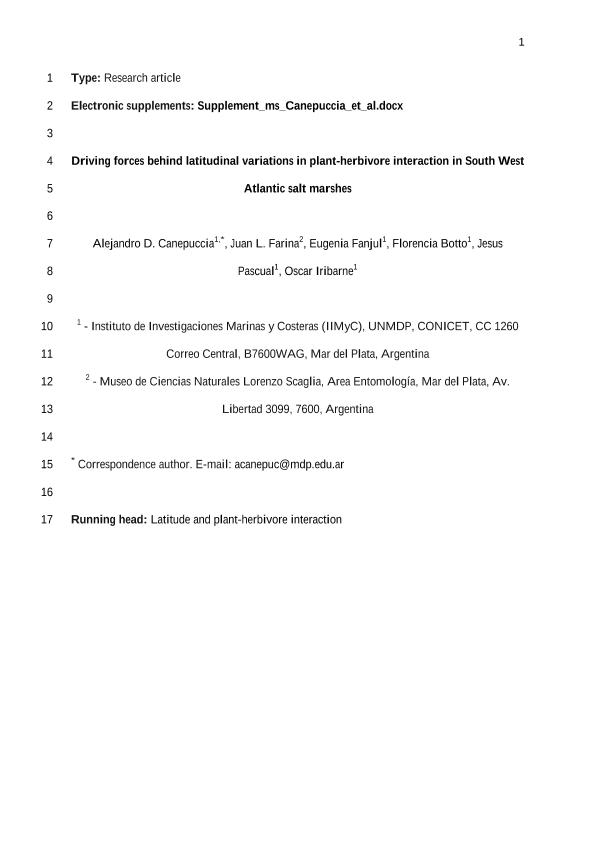Mostrar el registro sencillo del ítem
dc.contributor.author
Canepuccia, Alejandro Daniel

dc.contributor.author
Farina, Juan Luis

dc.contributor.author
Fanjul, Maria Eugenia

dc.contributor.author
Botto, Florencia

dc.contributor.author
Pascual, Jesus Maria

dc.contributor.author
Iribarne, Oscar Osvaldo

dc.date.available
2019-11-08T13:51:02Z
dc.date.issued
2018-09
dc.identifier.citation
Canepuccia, Alejandro Daniel; Farina, Juan Luis; Fanjul, Maria Eugenia; Botto, Florencia; Pascual, Jesus Maria; et al.; Driving forces behind latitudinal variations in plant-herbivore interactions in SW Atlantic salt marshes; Inter-Research; Marine Ecology Progress Series; 603; 9-2018; 93-103
dc.identifier.issn
0171-8630
dc.identifier.uri
http://hdl.handle.net/11336/88299
dc.description.abstract
Despite long-standing interest in the hypothesis that strength of plant-herbivore interactions decreases at higher latitude, supporting evidence is scarce and the data is conflicting. By field survey and two experiments we examined this hypothesis focusing on the herbivory by the stem-borer moth (Haimbachia sp. nov.) on the dominant SW-Atlantic marsh grasses (Spartina alterniflora and S. densiflora). Field surveys indicate that herbivore abundances and damage, although tending to decrease simultaneously, are unrelated to latitude. Herbivore abundances were related to latitude-dependent variables such as day length and temperature, and also to latitude-independent variables such as precipitation, salinity, and tide amplitude. Abundances were indirectly related to the effects of these variables and sediment characteristics on plant traits like density, height and tissue-composition. After 33-months, herbivore abundances and damage of high-latitude plants transplanted to low-latitude were 50-times greater than plants transplanted from low-to high-latitude sites. In a common-garden experiment (38º 56´ S) without herbivore pressure, differences persisted in plant traits from high and low latitude suggesting lack of herbivore induced effects on these plant traits. The persisting conspecific differences in plant-traits translocated along latitude suggest that these variations are under genetic control. Thus, our results provide evidence that although plant-herbivory interactions are more important at lower latitude, many additional and contingent variables unrelated with latitude can divert this geographic pattern.
dc.format
application/pdf
dc.language.iso
eng
dc.publisher
Inter-Research

dc.rights
info:eu-repo/semantics/openAccess
dc.rights.uri
https://creativecommons.org/licenses/by-nc-sa/2.5/ar/
dc.subject
trophic interactions
dc.subject
salinity
dc.subject
Spartina
dc.subject
stem-borer moth
dc.subject
salinity
dc.subject.classification
Ecología

dc.subject.classification
Ciencias Biológicas

dc.subject.classification
CIENCIAS NATURALES Y EXACTAS

dc.title
Driving forces behind latitudinal variations in plant-herbivore interactions in SW Atlantic salt marshes
dc.type
info:eu-repo/semantics/article
dc.type
info:ar-repo/semantics/artículo
dc.type
info:eu-repo/semantics/publishedVersion
dc.date.updated
2019-10-24T19:09:04Z
dc.identifier.eissn
1616-1599
dc.journal.volume
603
dc.journal.pagination
93-103
dc.journal.pais
Alemania

dc.journal.ciudad
Oldendorf
dc.description.fil
Fil: Canepuccia, Alejandro Daniel. Consejo Nacional de Investigaciones Científicas y Técnicas. Centro Científico Tecnológico Conicet - Mar del Plata. Instituto de Investigaciones Marinas y Costeras. Universidad Nacional de Mar del Plata. Facultad de Ciencias Exactas y Naturales. Instituto de Investigaciones Marinas y Costeras; Argentina
dc.description.fil
Fil: Farina, Juan Luis. Provincia de Buenos Aires. Municipalidad de General Pueyrredon. Secretaría de Cultura. Museo Municipal de Ciencias Naturales Lorenzo Scaglia; Argentina
dc.description.fil
Fil: Fanjul, Maria Eugenia. Consejo Nacional de Investigaciones Científicas y Técnicas. Centro Científico Tecnológico Conicet - Mar del Plata. Instituto de Investigaciones Marinas y Costeras. Universidad Nacional de Mar del Plata. Facultad de Ciencias Exactas y Naturales. Instituto de Investigaciones Marinas y Costeras; Argentina
dc.description.fil
Fil: Botto, Florencia. Consejo Nacional de Investigaciones Científicas y Técnicas. Centro Científico Tecnológico Conicet - Mar del Plata. Instituto de Investigaciones Marinas y Costeras. Universidad Nacional de Mar del Plata. Facultad de Ciencias Exactas y Naturales. Instituto de Investigaciones Marinas y Costeras; Argentina
dc.description.fil
Fil: Pascual, Jesus Maria. Consejo Nacional de Investigaciones Científicas y Técnicas. Centro Científico Tecnológico Conicet - Mar del Plata. Instituto de Investigaciones Marinas y Costeras. Universidad Nacional de Mar del Plata. Facultad de Ciencias Exactas y Naturales. Instituto de Investigaciones Marinas y Costeras; Argentina
dc.description.fil
Fil: Iribarne, Oscar Osvaldo. Consejo Nacional de Investigaciones Científicas y Técnicas. Centro Científico Tecnológico Conicet - Mar del Plata. Instituto de Investigaciones Marinas y Costeras. Universidad Nacional de Mar del Plata. Facultad de Ciencias Exactas y Naturales. Instituto de Investigaciones Marinas y Costeras; Argentina
dc.journal.title
Marine Ecology Progress Series

dc.relation.alternativeid
info:eu-repo/semantics/altIdentifier/url/https://www.int-res.com/prepress/m12705.html
dc.relation.alternativeid
info:eu-repo/semantics/altIdentifier/doi/https://doi.org/10.3354/meps12705
Archivos asociados
